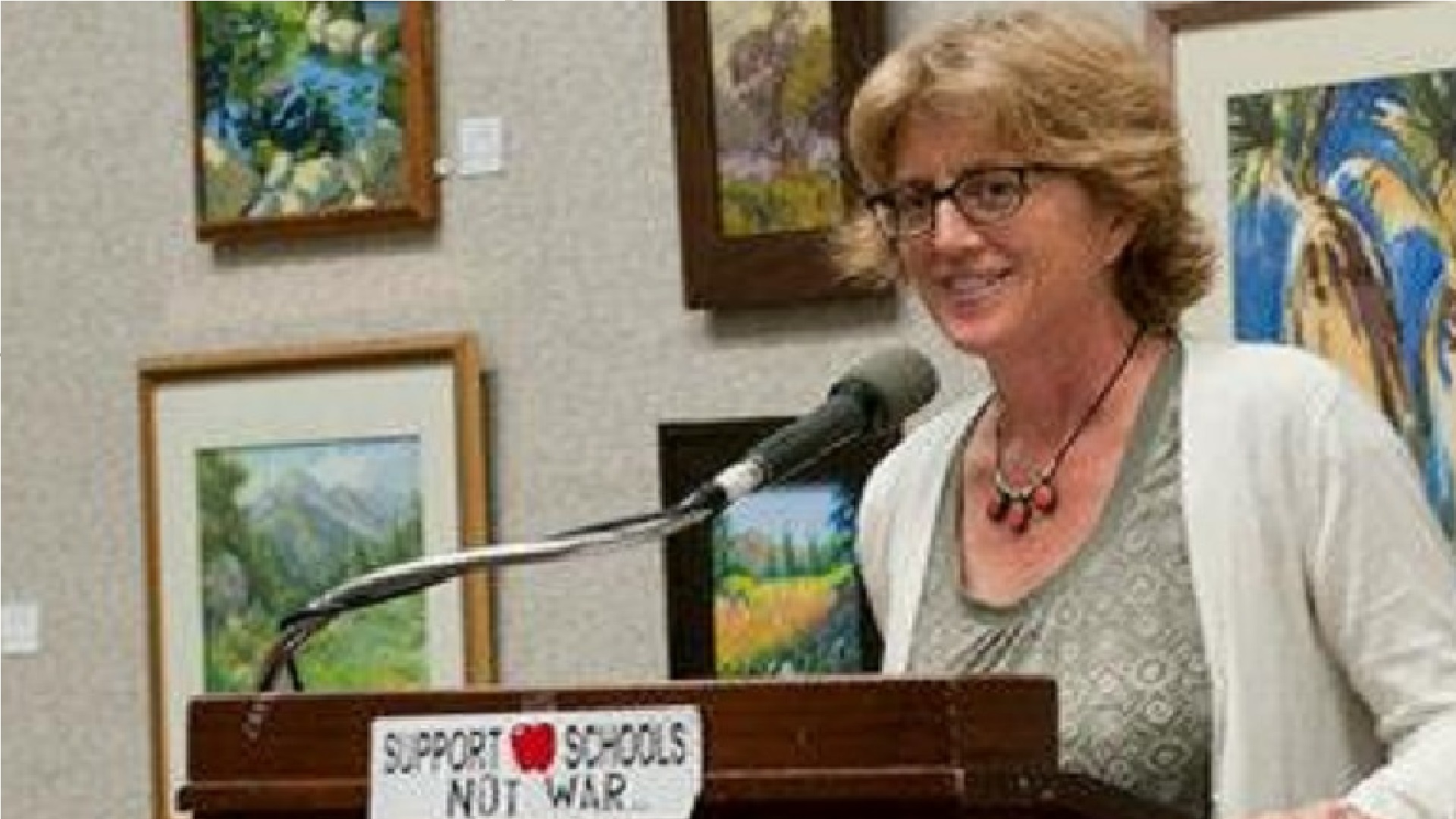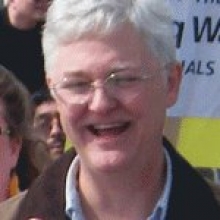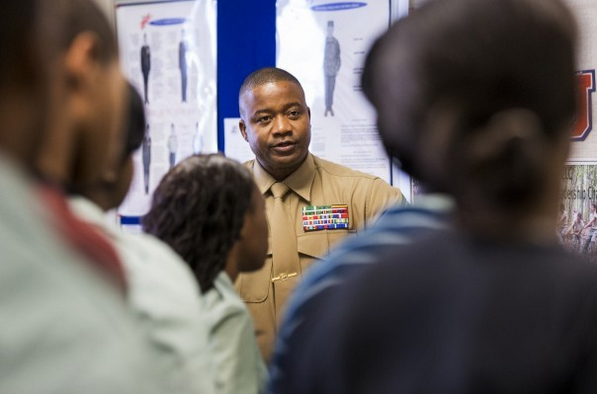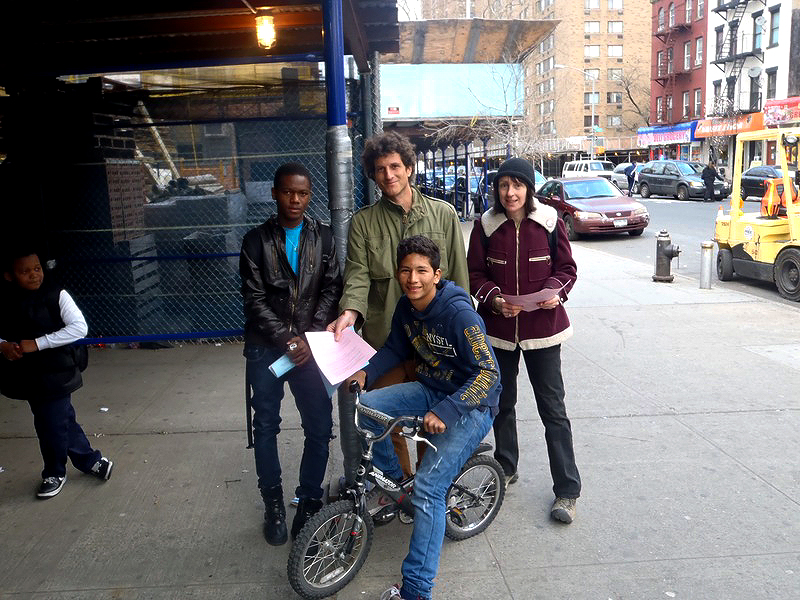Kate Connell -
 In the spring of 2014, I went to observe a career day at Santa Barbara High School, where my son is enrolled. There were a variety of organizations with representatives and literature tables. The Marines and the Navy recruiters were also there. They were soliciting student contact information. The Marine’s “survey” form included questions such as, “Did you know that the Marine Corps has a $150,000 scholarship?” and “Did you know that the qualifications for the Marine Corps are higher than the standards of UC Santa Barbara?” I told them that under the school’s existing recruiting protocol they were not allowed to get student information directly from students, and that they had to go through the Santa Barbara Unified School District office.
In the spring of 2014, I went to observe a career day at Santa Barbara High School, where my son is enrolled. There were a variety of organizations with representatives and literature tables. The Marines and the Navy recruiters were also there. They were soliciting student contact information. The Marine’s “survey” form included questions such as, “Did you know that the Marine Corps has a $150,000 scholarship?” and “Did you know that the qualifications for the Marine Corps are higher than the standards of UC Santa Barbara?” I told them that under the school’s existing recruiting protocol they were not allowed to get student information directly from students, and that they had to go through the Santa Barbara Unified School District office.
I turned around and saw the school's career counselor and approached him, reminding him about the school's recruiter protocol. He didn’t recall that part of the protocol and said he would talk to the military recruiters about it. I asked, “What about the information they have already gathered from students?” I went back to the Marine recruiters and repeated that they were not allowed to solicit student information. I picked up the surveys they had collected and said that I was going to tear them up and throw them out. They consented, so I ripped them up.
I went to the Navy recruiters’ table and told them the same thing. They had a binder with the protocol in it and looked it up. The Navy recruiter said, "That's correct, here it is, in 'G.'" (G. Recruiters visiting schools shall not at any time solicit contact information directly from students or require it as a condition to participate in an activity or receive an award or gift.) I said, "I am going to take this sign-up sheet and tear it up," holding it up for them to see, and they also said ok.

 During the last year or so about half of the states have enacted legislation aimed at protecting student privacy. Meanwhile, President Obama has called for a Student Data Privacy Act, saying “data collected on students in the classroom should only be used for educational purposes — to teach our children, not to market to our children.”
During the last year or so about half of the states have enacted legislation aimed at protecting student privacy. Meanwhile, President Obama has called for a Student Data Privacy Act, saying “data collected on students in the classroom should only be used for educational purposes — to teach our children, not to market to our children.” Military recruiters must feel like Hansel and Gretel’s “wicked witch,” fattening up the children to eat them. With sexual violence, endless wars of occupation, fatalities, brain trauma, permanent disabilities and an epidemic of suicides, what they’re selling these days looks like a lot like a bad horror show.
Military recruiters must feel like Hansel and Gretel’s “wicked witch,” fattening up the children to eat them. With sexual violence, endless wars of occupation, fatalities, brain trauma, permanent disabilities and an epidemic of suicides, what they’re selling these days looks like a lot like a bad horror show.
 “My religion is based on truth and nonviolence” ?
“My religion is based on truth and nonviolence” ?  “Wars are poor chisels for carving out peaceful tomorrows."
“Wars are poor chisels for carving out peaceful tomorrows."  “I have long since come to believe that people never mean half of what they say, and that it is best to disregard their talk and judge only their actions.” ?
“I have long since come to believe that people never mean half of what they say, and that it is best to disregard their talk and judge only their actions.” ?  Nik Branham said nothing, holding the phone in its camouflage case close enough that his face glowed. The woman supported her 17-year-old’s plan to join the Army, but she didn’t understand it. These papers were a miracle, as she saw it, college at least partially paid for because of the hell he had survived, a chance at an education and maybe a few more years of football, the game he once loved.
Nik Branham said nothing, holding the phone in its camouflage case close enough that his face glowed. The woman supported her 17-year-old’s plan to join the Army, but she didn’t understand it. These papers were a miracle, as she saw it, college at least partially paid for because of the hell he had survived, a chance at an education and maybe a few more years of football, the game he once loved. Once again, US politicians and pundits are beating the drums of war, trying to get our nation involved in yet another conflict. A few years ago it was Iran, with “all options on the table.” Last year it was a red line that threatened to drag us into the conflict in Syria. This time it’s Iraq.
Once again, US politicians and pundits are beating the drums of war, trying to get our nation involved in yet another conflict. A few years ago it was Iran, with “all options on the table.” Last year it was a red line that threatened to drag us into the conflict in Syria. This time it’s Iraq. Twice a year, at New York City high schools, volunteers distribute non-military informational flyers to parents and students during parent teacher conference night. Following is the report for the November 5, 2014 action.
Twice a year, at New York City high schools, volunteers distribute non-military informational flyers to parents and students during parent teacher conference night. Following is the report for the November 5, 2014 action. Though the
Though the  David Swanson is the author of the new book, Daybreak: Undoing the Imperial Presidency and Forming a More Perfect Union, by Seven Stories Press and of the introduction to The 35 Articles of Impeachment and the Case for Prosecuting George W. Bush by Dennis Kucinich. In addition to cofounding AfterDowningStreet.org, he is the Washington director of Democrats.com and sits on the boards of a number of progressive organizations in Washington, DC.
David Swanson is the author of the new book, Daybreak: Undoing the Imperial Presidency and Forming a More Perfect Union, by Seven Stories Press and of the introduction to The 35 Articles of Impeachment and the Case for Prosecuting George W. Bush by Dennis Kucinich. In addition to cofounding AfterDowningStreet.org, he is the Washington director of Democrats.com and sits on the boards of a number of progressive organizations in Washington, DC. Jorge Mariscal is the grandson of Mexican immigrants and the son of a U.S. Marine who fought in World War II. He served in the U.S. Army in Vietnam and currently teaches at the University of California, San Diego.
Jorge Mariscal is the grandson of Mexican immigrants and the son of a U.S. Marine who fought in World War II. He served in the U.S. Army in Vietnam and currently teaches at the University of California, San Diego. Matt Guynn plays the dual role of program director and coordinator for congregational organizing for On Earth Peace, building peace and nonviolence leadership within the 1000+ congregations of the Church of the Brethren across the United States and Puerto Rico. He previously served a co-coordinator of training for Christian Peacemaker Teams, serving as an unarmed accompanier with political refugees in Chiapas, Mexico, and offering or supporting trainings in the US and Mexico.
Matt Guynn plays the dual role of program director and coordinator for congregational organizing for On Earth Peace, building peace and nonviolence leadership within the 1000+ congregations of the Church of the Brethren across the United States and Puerto Rico. He previously served a co-coordinator of training for Christian Peacemaker Teams, serving as an unarmed accompanier with political refugees in Chiapas, Mexico, and offering or supporting trainings in the US and Mexico. Rick Jahnkow works for two San Diego-based anti-militarist organizations, the Project on Youth and Non-Military Opportunities and the Committee Opposed to Militarism and the Draft. He can be reached at:
Rick Jahnkow works for two San Diego-based anti-militarist organizations, the Project on Youth and Non-Military Opportunities and the Committee Opposed to Militarism and the Draft. He can be reached at:  Pat Elder was a co-founder of the
Pat Elder was a co-founder of the 